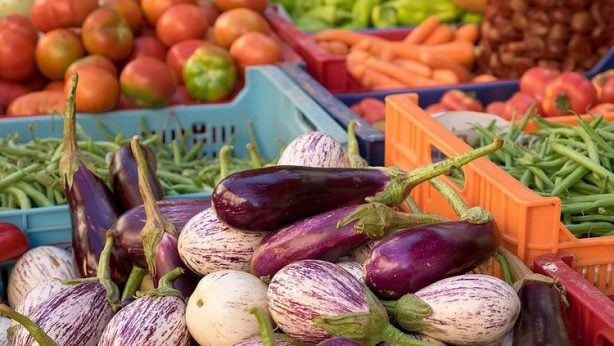Ever wondered if that zip lock bag of frozen peas sitting in your freezer for the past six months is still good food? Turns out, it just might be.
I recently wrote about an experiment I did in visualising historical agricultural prices in Trinidad & Tobago. I had briefly touched on an article I had read about local poultry farmers complaining of imported frozen chicken that was already frozen for 180 days.
So it got me thinking, how long can food be stored before it has to be thrown away? I did some searching on Google and Bing, but I couldn’t find any results specific to Trinidad. There were quite a lot of articles about food storage on various blogs and news sites, however If I’m going to write about proper food storage, then I needed a source that’s reliable.
Government Of Canada Safe Food Storage
I travel between Trinidad & Tobago and Canada somewhat often. One of things I appreciate about the Canadian government is their concern about public health and safety. Perhaps, while it may not be the best, they do make quite an effort.
I came across this safe food storage guide a few months ago; I was a little hesitant to use it as a source of information, mainly because Trinidad’s climate is much different than Canada’s. Ultimately I decided to use it, since we’re dealing with the storage of food in a fridge/freezer. To learn more you can visit the safe food storage page on the Government of Canada’s website.
Health Risks
Consumption of improperly stored food can have severe health effects and in some cases lead to death. Foodborne illness or more commonly known as “food poisoning”, is the result of consuming food that has been contaminated.
Symptoms of food poisoning can include:
- vomiting
- nausea
- stomach cramps
- diarrhea
- headache
- constipation
- persistent fever
Symptoms may suddenly, after several hours and even several days after consuming contaminated food. The good news is that most people will make a complete recovery from eating contaminated food. The bad news is that some groups of people are at higher risk of suffering more serious effects.
Groups at higher risk include:
- pregnant women
- children under the age of five
- adults over the age of 60
- people with weakened immune systems
If you believe you have food poisoning, it’s always a good idea to see a healthcare professional. If you believe you contracted food poisoning from a restaurant, you should file a complaint with your local government official and the ministry of health to have the matter looked into.
Shopping tips
- Buy cold or frozen food at the end of your shopping trip.
- Check the “best before” date on your food.
- Keep your raw meat, poultry, fish and seafood away from other food in your grocery cart.
- Examine fruits and vegetables carefully and avoid buying items that are bruised or damaged.
- If you use reusable grocery bags or bins, make sure to use a specific bag or bin for meat, poultry or seafood. Label the bag or bin with the type of food it carries.
Chilling
It is extremely important to keep cold food cold and hot food hot, so that your food never reaches the “temperature danger zone”. This is where bacteria can grow quickly and cause food related illness.
- Keep your raw meat, poultry, fish and seafood cold. Refrigerate or freeze them as soon as you get home from the grocery store.
- Refrigerate fresh fruits and vegetables that need refrigeration when you get home. This includes all pre-cut and ready-to-eat produce.
- Make sure your refrigerator is set at 4 °C (40 °F) or lower and your freezer at -18 °C (0 °F) or lower. This will keep your food out of the temperature danger zone between 4 °C (40 °F) to 60 °C (140 °F) where bacteria can grow quickly.
- Keep your raw meat, poultry, fish and seafood separate from other food in the refrigerator at home. Do this by storing them in different containers.
- Place raw meat, poultry, fish and seafood in sealed containers or plastic bags on the bottom shelf of your refrigerator so raw juices won’t drip onto other food.
Cleaning
Cleaning your hands, kitchen surfaces and utensils, fruit and vegetables and reusable grocery bags will help eliminate bacteria and reduce the risk of food related illness.
- Wash your hands with soap and warm water for at least 20 seconds.
- Use one cutting board for produce, and a separate one for raw meat, poultry, fish and seafood.
- Use paper towels to wipe kitchen surfaces, or change dishcloths daily to avoid the risk of cross-contamination and the spread of bacteria and avoid using sponges, as they are harder to keep bacteria-free.
- Sanitize countertops, cutting boards and utensils before and after preparing food. Use a kitchen sanitizer (following the directions on the container) or a bleach solution (5 ml household bleach to 750 ml of water), and rinse with water.
Storing Eggs
It’s important to consider how eggs are stored. If your eggs have been washed to remove dirt or other organic matter, you must store the eggs in the fridge. When hens lay eggs, there’s a natural coating protecting the egg from bacteria called the “bloom”.
If your eggs haven’t been washed, you can store them in an area that’s dry and cool for about a week. If the eggs have been washed then the bloom is most likely gone and the eggs become susceptible to bacteria growth. The best way to slow the growth of bacteria is a cold environment, such as your fridge.
I had to double check with a friend how eggs are handled in Trinidad & Tobago between producer and consumer. Years ago it was common to buy eggs from local suppliers who usually did not wash the eggs. Now, most individuals purchase their eggs from supermarkets, which means more likely than not they were washed. If you are unsure, you can always read the information on the carton or ask an associate who works there.
Washed eggs, or no washed eggs. It’s still a good idea to store your eggs in the fridge, preferably in the back of the fridge where it will maintain a constant cool temperature even if the door is open. Eggs stored in the fridge will always last longer.
Fridge and freezer storage
The following recommended refrigeration times are for safety, and the freezing times are for quality. If you store properly wrapped food in your freezer the quality may be maintained for longer periods of time.




Comments: no replies